In 2024, ABUAD has continued its collaboration with the Durban University of Technology’s (DUT’s) Dr Emem Anwana, the Faculty Research Co-ordinator at the Faculty of Management Sciences, was recently invited by the Vice-Chancellor of the Afe Babalola University, Ado Ekiti (ABUAD) in Nigeria, Professor Smaranda Olarinde on an academic exchange from 11 January to 15 January 2024. The aim of the visit was for Dr Anwana to engage in various sustainability in academic programmes to strengthen areas of collaboration between DUT and ABUAD, Africa’s fastest growing university.
This visit to ABUAD comes after a Memorandum of Understanding (MoU) partnership which was signed between DUT and ABUAD, last year, 31 August 2021. DUT and ABUAD signed a Memorandum of Understanding (MOU) which also forms part of DUT’s ENVISION2030 that is to build mutually beneficial partnerships.
The ABUAD-DUT MOU aims to enhance the international engagement and capabilities of DUT and ABUAD. To do so, it has set out two key goals which are to establish precise academic and financial arrangements and to support, as appropriate, the exchange of personnel between DUT and ABUAD and conduct collaborative research projects to innovate and address challenges identified by both or either party. The virtual signing ceremony also included the orientation of DUT postgraduate students from the Faculty of Management Sciences.
Dr Anwana explained how the partnership came about with DUT and ABUAD, stating: “On the 31st August 2021, the vice-chancellors of both DUT and ABUAD signed an MOU online which included amongst other things, to train ABUAD staff members to attain higher qualifications in both Master and PHD’s, to conduct academic exchanges amongst both staff and students of both institutions and for academic conferences and webinars to be hosted by both institutions.”
In May 05, 2024, ABUAD Institute for Oil, Gas, Energy, Environment and Sustainable Development (OGEES Institute (OGEES) in collaboration with the International Law Association (Nigerian branch) and the Green Institute, is organizing INTERNATIONAL CONFERENCE ON ENVIRONMENTAL LAW, GOVERNANCE AND SUSTAINABLE DEVELOPMENT with the theme CLIMATE CHANGE, ENERGY TRANSITION AND LOOKING BEYOND, THE EARTH’S FUTURE: THE ROLE OF STAKEHOLDERS IN SUSTAINING INTERNATIONAL ENVIRONMENTAL RULE OF LAW.
The International Conference on Environmental Law, Governance, and Sustainable Development provides a timely opportunity to critically investigate practical, philosophical, and methodological approaches for addressing longstanding barriers to the effective design and implementation of environmental law.
This Conference brings together governments, business leaders, environmental educators, academics, and
practitioners to exchange knowledge experience and learn from each other on how to strengthen the implementation and application of the international environmental rule of law in Africa and beyond.
In June 5, 2021, during the World Environment Day, the Institute for Oil, Gas, Energy, Environment and Sustainable Development (OGEES Institute) in conjunction with Afe Babalola University organized the 2021 edition of the World Environment Day (WED) symposium with the theme: Ecosystem Restoration. Sustainability experts drawn from the University and across the frontier host a hybrid (Online and In-person) summit time #Ecosystem Restoration for the World Environment Day, a United Nations awareness campaign for environmental protection, held annually since 1974. Participants were sensitized on GHG emissions’ management, energy utilization and conservation, advocacy on public pledge of 100% renewable energy, reafforestation, and fossil fuel divestment methodology among many others. The programme commenced at 12noon GMT.

ABUAD has continued its strategic partnerships with non-governmental organizations (NGOs) to promote local awareness on aspects of the SDGs including, zero hunger, good health and well-being. Peace justice and strong institution, climate change, pollution control and conservation among many others.
In June 5, 2020, Jeffrey Sachs (SDSN), Adenike Akinsemolu (Green Institute/OGEES, ABUAD), and Hamad Bin Khalifa University (Qatar Foundation) will be gathering sustainability experts from across the globe to host a virtual summit Time #ForNature for the World Environment Day, a United Nations awareness campaign for environmental protection, held annually since 1974.
Since the industrial era, humans have practiced dominance instead of coexistence with nature. The latest lockdown made it possible to review environmental concerns that humanity is currently facing. Scientists and most authorities agree that the world is experiencing an unprecedented ecological crisis, with large numbers of species on the brink of extinction and rising global temperatures continuing. We weren’t prepared for Covid-19, and we have paid the price – but the cost of ecological collapse and biodiversity loss will be too high, and we cannot afford to wait any longer. Perhaps, now is the time to evaluate our past, present, and future decisions to realize the future we want.
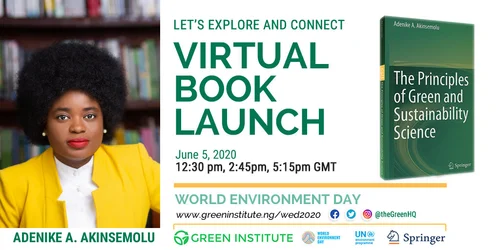
Adenike Akinsemolu, the founder of the Green Institute, a leading and multiple award-winning sustainability research institute in Nigeria and a Senior Fellow of Environment and Sustainable Development at the Institute for Oil, Gas, Energy, Environment, and Sustainable Development at Afe Babalola University, Nigeria, is hosting a virtual summit Time #ForNature in partnership with Hamad Bin Khalifa University (a member of Qatar Foundation) and the UN Sustainable Development Solutions Network that will focus on sustainability and green education. The theme for World Environment Day, June 5, 2020, is biodiversity.
The online event will cover a range of topics such as biodiversity conservation, infectious diseases, sustainable agriculture, sustainable building, urban innovation, minimal living, waste management, renewable energy, etc. This paradigm-shifting online symposium will gather over 25 eminent sustainability leaders in different professions around the world to provide an opportunity to learn from successful cases and technologies for achieving Environmental Sustainability.

One of the keynote speakers is Jeffrey D. Sachs, who was named twice by Time magazine as one of the 100 most influential world leaders and ranked by The Economist among the top three most influential living economists. Jeffrey D. Sachs will join the conversation to discuss building resilient health structures to combat novel diseases. He has been an advisor to three United Nations Secretaries-General, and currently serves as an SDG Advocate under Secretary- General António Guterres. Jeffrey Sachs, being a University professor, is also the Director of the Center for Sustainable Development at Columbia University, a commissioner of the UN Broadband Commission for Development and the Director of the UN Sustainable Development Solutions Network.
“Everyday anthropogenic activities are responsible for the problems of our planet, and there is a need to salvage the situation through creativity, innovation, and critical thinking,”Adenike Akinsemolu stresses in her recent book, The Principles of Green and Sustainability Sciences (Springer, 2020), which will be launched at the event. In the book, Akinsemolu offers a detailed and step-by-step guide to understanding sustainability and discusses best practices to establish a more harmonious and balanced approach to living, highlighting her efforts in Africa and successful global cases. It is also one of the first texts, which examines sustainability issues in Africa.
Her Green Institute has already recruited more than 5,500 ambassadors and trained over 25,000 people globally. The revolutionary Trash for Education model lets hundreds of students study for free in exchange for collected waste. Its programs include the Green School, nano-degree-programs in sustainability and social entrepreneurship, The Green Kids Club, mentorship program and prizes for girls in sustainability, and research initiatives.
The participating organizations include the UNDP, Qatar Green Building Council, Qur’anic Botanic Garden, Farm Lab, Human Future, Springer Nature, Institute for Oil, Gas, Energy, Environment and Sustainable Development, University of Basel, the Open University UK, TerraCycle, Design Future(s) Initiative of Georgetown University, United Nations Development Program, and the Green Maasai Troupe Doha Qatar.
Press Credentials
To request a press credential, email Kate Kifa at pr@greeninstitute.ng with PRESS CREDENTIAL REQUEST in the subject line.
For more information and the full schedule: www.greeninstitute.ng/wed2020
About
The Green Institute, a leading and multiple award-winning research institute founded by Adenike Akinsemolu in Nigeria, is dedicated to the broad sustainability discourse, and to training leaders who will systematically transform attitudes about environmentalism in Africa. Its programs include the Green School and The Green Kids Club for kids and young adults, recycling programs such as Trash for Education, nano-degree-programs in Sustainable Science and Technology, Sustainable Business and Social Entrepreneurship, and research initiatives. https://greeninstitute.ng
Adenike Akinsemolu, Ph.D. is the founder of the Green Institute, a leading and multiple award-winning research institute in Nigeria dedicated to the broad sustainability discourse and to training leaders who will systematically transform attitudes about environmentalism in Africa. She holds a Ph.D. in Environmental Microbiology and a Postgraduate Diploma in Education. She is a Senior Fellow of Environment and Sustainable Development at the Institute for Oil, Gas, Energy, Environment, and Sustainable Development at Afe Babalola University, Nigeria. Her most recent book, The Principles of Green and Sustainability Science (2020), is the first sustainability text to deal exclusively with sustainability issues in Africa while offering viable solutions for the problems besetting our societies, especially the environment and unemployment.
Jeffrey D. Sachs, Ph.D. is a University Professor and Director of the Center for Sustainable Development at Columbia University, where he directed the Earth Institute from 2002 until 2016. He is also Director of the UN Sustainable Development Solutions Network and a commissioner of the UN Broadband Commission for Development. He has been an advisor to three United Nations Secretaries-General and currently serves as an SDG Advocate under Secretary- General António Guterres. He spent over twenty years as a professor at Harvard University, where he received his BA, MA, and Ph.D. degrees. He has authored numerous bestseller books. His most recent book is Ages of Globalization: Geography, Technology, and Institutions (2024). Sachs was twice named as Time Magazine’s 100 most influential world leaders and was ranked by The Economist among the top three most influential living economists.

In like manner, the Director of Institute for Oil, Gas, Energy, Environment, and Sustainable Development at Afe Babalola University, Nigeria has been appointed by the African Commission on Human and Peoples Rights Working Group on Extractive Industries, Environment and Human Rights Violations to entrench global best practices for SDGs collaboration. This appointment took effect from 08 August 2020 and still continues in 2024.
Read more – ABUAD DVC gets AU environmental rights appointment
In the recent appointment into the Board of Association of African Universities(AAU), the Acting Vice-Chancellor, Afe Babalola University, Ado-Ekiti (ABUAD), Prof. Smaranda Olarinde has been appointed as a Member of the AAU Board. This appointment is to ensure the best practices are entrenched in the governance of African Universities of which sustainable development goals collaboration is of high significance. Read more – AAU Inaugurates New Governing Board Members
RELATED LINKS
Afe Babalola University Takes A Green Leap
Group Visits ABUAD’s Planetarium To Mark World Earth Day, Cleans Up Ekiti
World Earth Day: Triple G clean up Ekiti, visits ABUAD’S planetarium
ABUAD’s OGEES Institute partners with global coalition on World Environment Day
2024 ABUAD Law and Community Legal Clinic Report· Post
Afe Babalola University (ABUAD) has established the Law and Community Legal Clinic as part of a strategic effort to revolutionize tertiary education in Nigeria. This initiative was deemed necessary to restore Nigeria’s once-excellent reputation in the educational sector. The vision for this endeavor is firmly rooted in the principles of the university’s founder, Aare Afe Babalola, SAN, D. Litt, CFR.
Afe Babalola University (ABUAD) has established the Law and Community Legal Clinic as part of a strategic effort to revolutionize tertiary education in Nigeria. This initiative was deemed necessary to restore Nigeria’s once-excellent reputation in the educational sector. The vision for this endeavor is firmly rooted in the principles of the university’s founder, Aare Afe Babalola, SAN, D. Litt, CFR.
In line with this vision, the University has developed numerous programs and courses designed not only to highlight its unique approach but also to prepare students for contemporary socio-economic challenges. The ABUAD Law and Community Legal Clinic was crafted by one of the foremost educators at the University, currently serving as both the Vice Chancellor and the pioneer Director of the Clinic, Prof. Smaranda Olarinde. The clinic emphasizes the vocational aspect of legal education, ensuring that students are equipped to meet the complex and dynamic demands of the legal profession. By participating in a service-learning program, students enhance their skills and gain experience that adds critical value to the legal industry.
In 2024, the Law and Community Legal Clinic continues to be an integral component of a mandatory course titled “Introduction to Legal Practice,” taken by 400-level students in the College of Law during their first and second semesters. This course allows students to apply their theoretical knowledge to practical situations, covering alternative dispute resolution (ADR) skills such as negotiation, mediation, arbitration, and conciliation, along with hybrid methods like med-arb. To further deepen their understanding, students are encouraged to take certified courses offered by the Nigerian Institute of Chartered Arbitrators. Under the supervision of staff clinicians, student clinicians work on resolving disputes brought to the Law Clinic.
The human rights knowledge students gain in class inspires them to reach out to secondary school students, raising awareness about their rights and obligations as citizens of Nigeria. Additionally, student-clinicians conduct advocacy visits to communities to educate women about their rights and interview detainees in Nigerian correctional facilities in Ado-Ekiti.
The Law Clinic is strategically located on the ground floor of the College of Law, ensuring easy access for clients while maintaining privacy. It features a large reception area where prospective clients are welcomed and made comfortable as their bio-data and requests are documented. The clinic also includes four private interviewing rooms to ensure confidentiality and create a conducive environment for interaction between clients and clinicians.
The clinic is staffed by a director, an administrator, staff clinicians, and student clinicians. The administrator, who is also a lecturer in the College of Law, oversees and coordinates the clinic’s activities. The staff clinicians are law lecturers at ABUAD trained in clinical practice and ADR methods. The student-clinicians are 400-level students in the College of Law.
2.0 Mission and Objectives
The mission of the clinic is to cultivate twenty-first-century lawyers who can effectively compete with their peers in the global legal industry through service-learning and clinical legal education. To achieve this mission, the following objectives have been established:
- Build the capacity of student-clinicians to become strong, responsible community leaders capable of independently and collaboratively designing and implementing legal solutions to social problems, particularly for low-income households.
- Provide free legal services to indigent individuals and low-income families in the immediate community through supervised participation, allowing them to complete their university education.
- Instill values of integrity, pro bono service, and discipline in law students at Afe Babalola University.
- Equip students with ADR skills to offer solutions to cases without resorting to litigation.
- Promote peaceful coexistence and help alleviate the congestion in courts.
- Encourage peace and progress within the community through strategic collaborations with relevant stakeholders.
2.1 Activities
To fulfill the objectives of the ABUAD Law and Community Legal Clinic, several activities were planned and executed during the review period, including:
- Providing legal services to students from low-income households to assist them in completing their university programs.
- Strategic advocacy for low-income students and indigent individuals.
Hosting a symposium on women’s rights addressing gender-based violence and sexual harassment. - Awareness campaign on human rights within and outside the university.
- Client interviews and counseling.
- Symposium with the Nigeria Police and the Ekiti State Ministry of Justice.
- Legal aid and sensitization at Odo-Ado Police Station.
- Interviews with prison inmates; legal aid and humanitarian assistance at Ado-Ekiti Prisons.
- Sensitization of children about their rights in secondary schools.
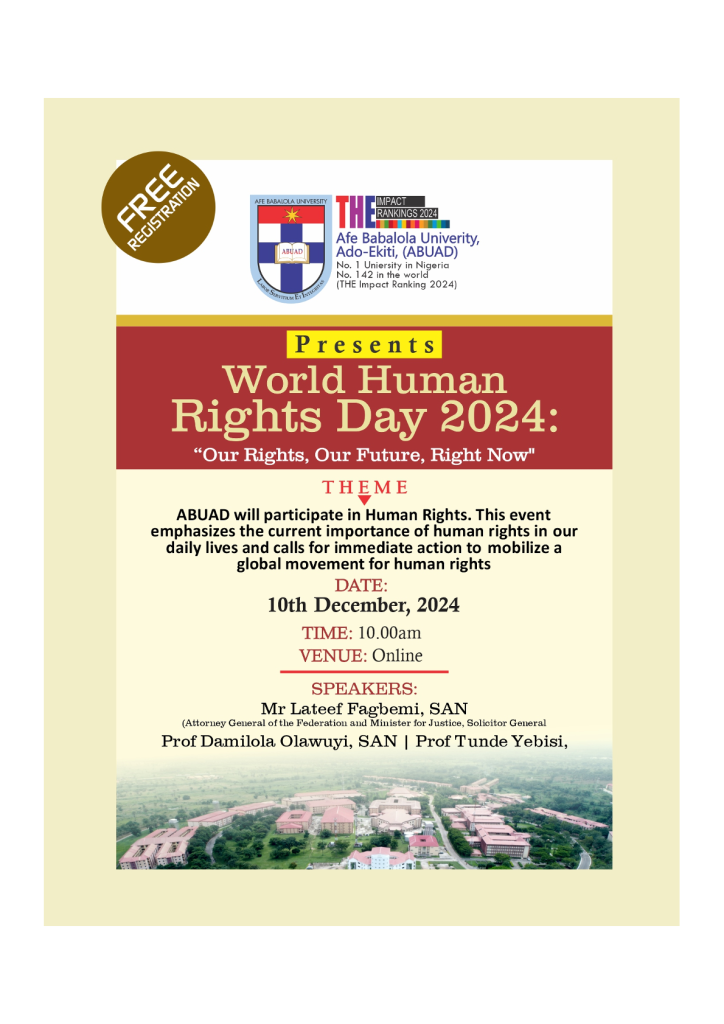
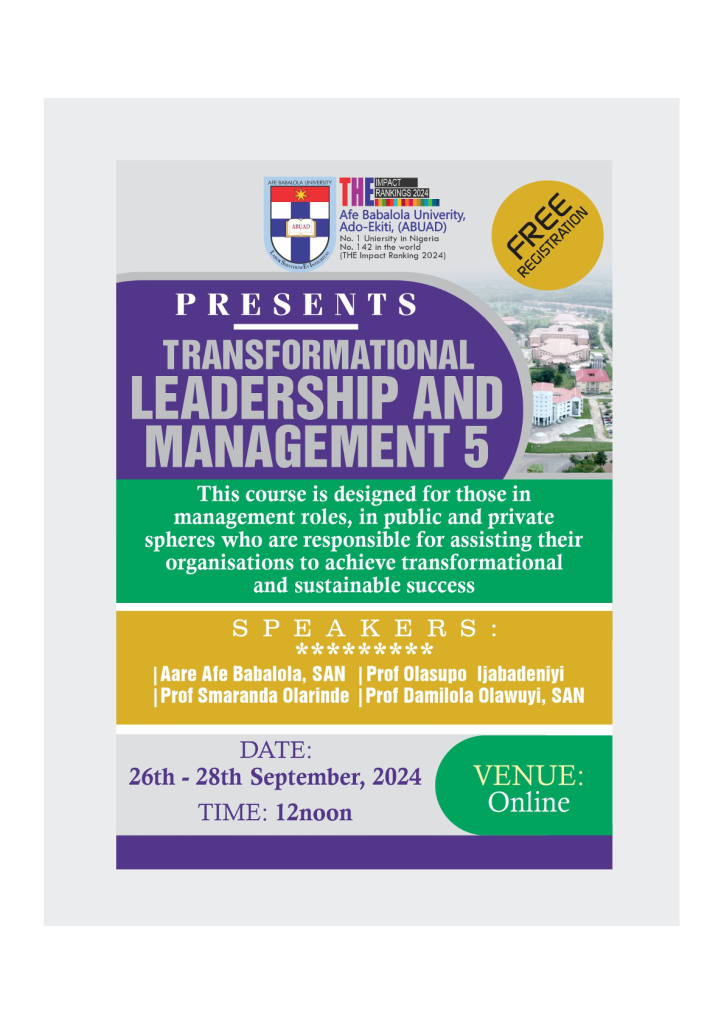
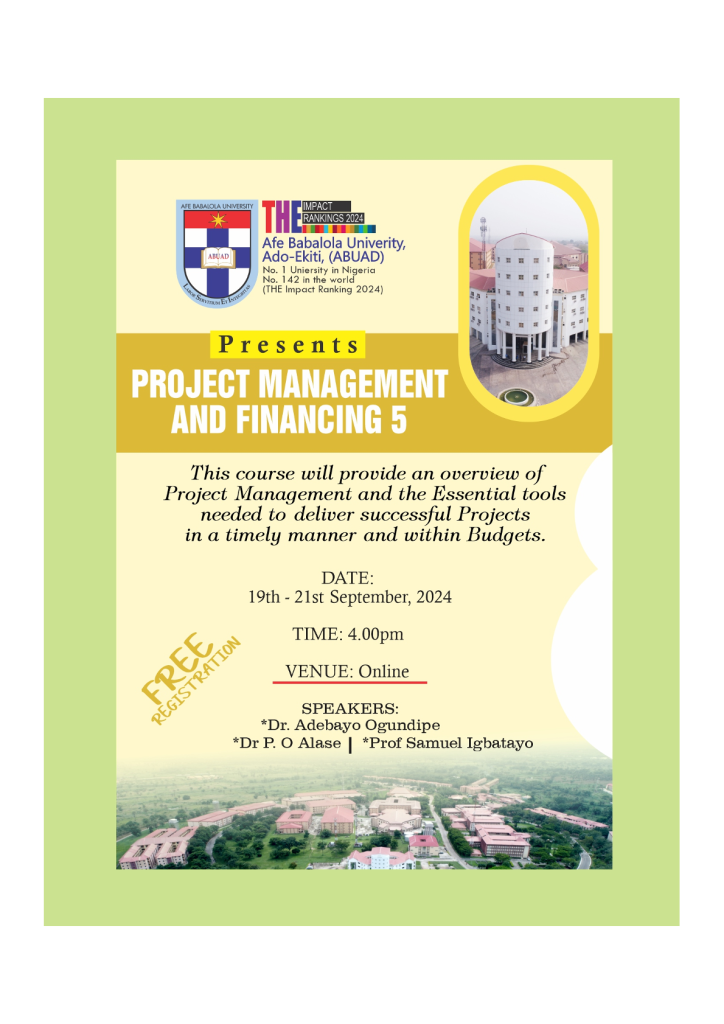
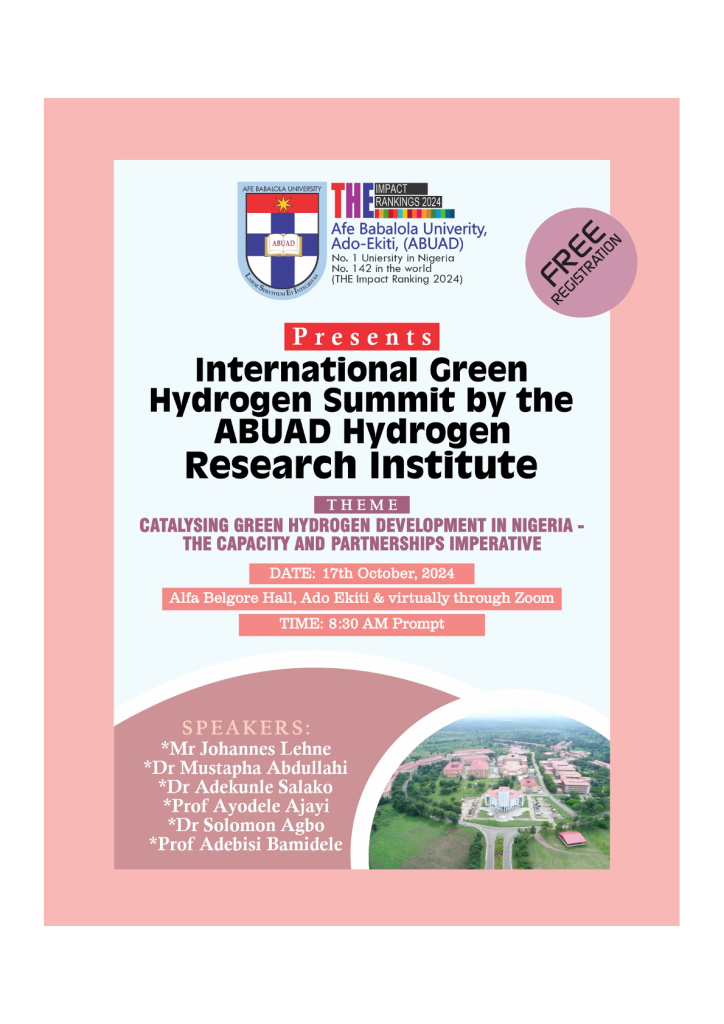
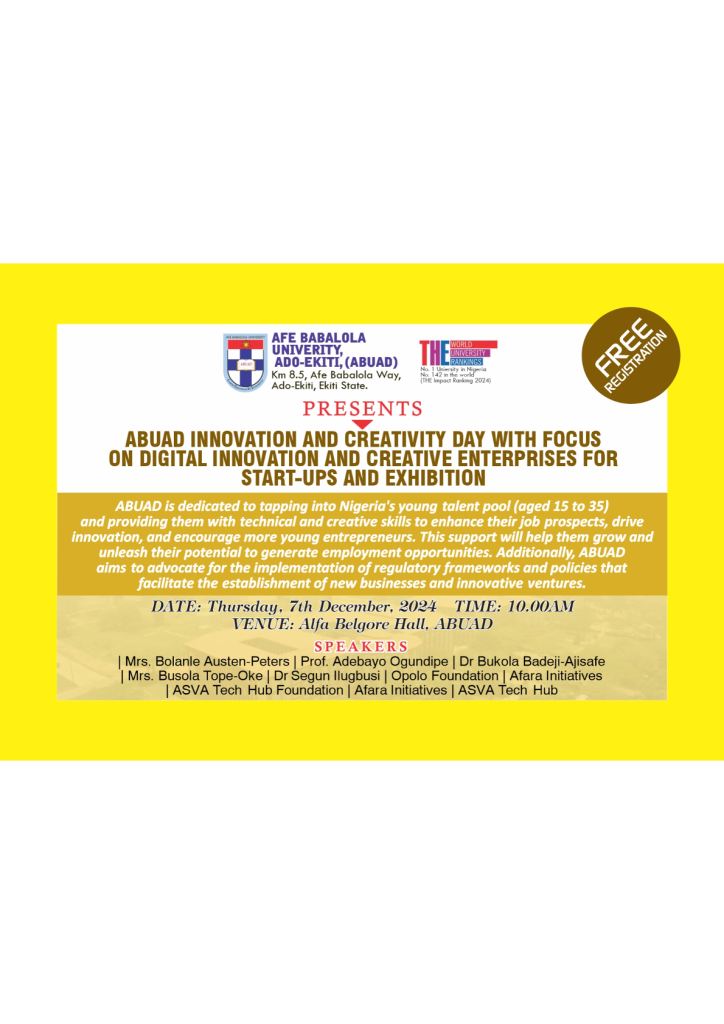
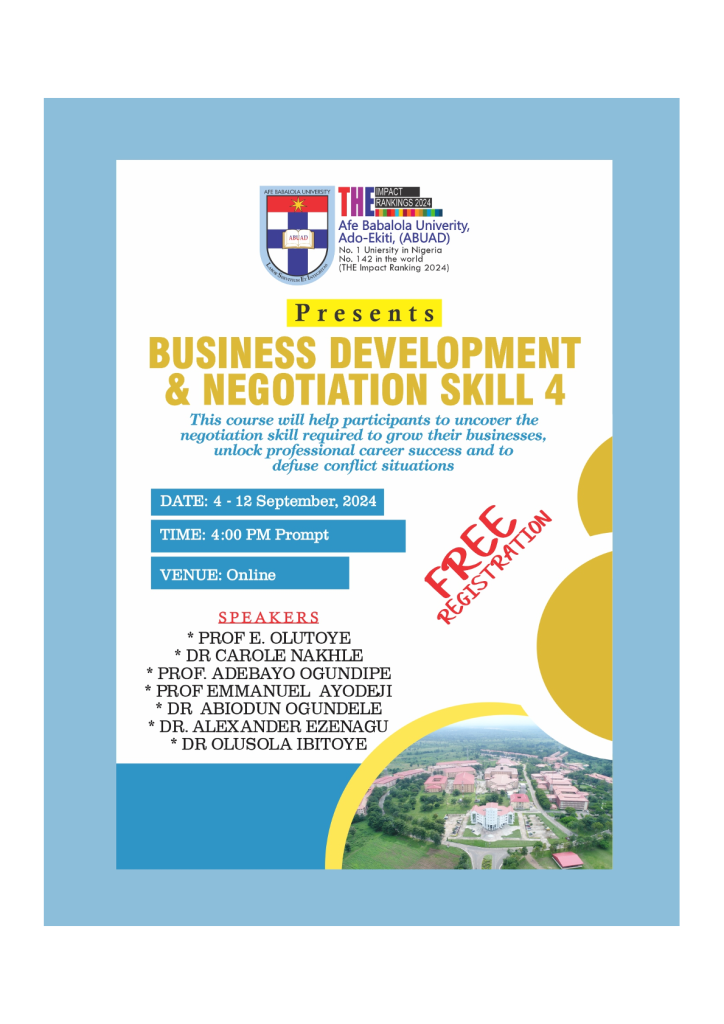
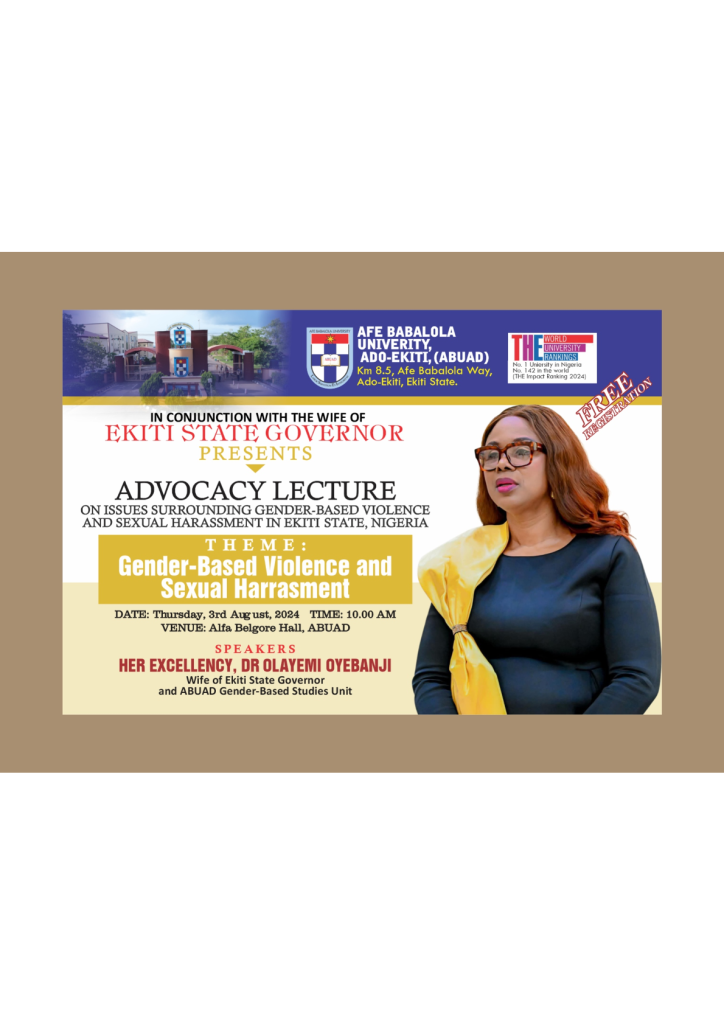
On December 10, 2024, the ABUAD Law and Community Legal Clinicians visited Ekiti
State House of Assembly as students’ parliamentarians to engage the leadership of the Ekiti State House of Assembly on the need to enact a bill that will ensure better human rights for the people from low-income households and people living with disability. It is also a time to celebrate Human Rights 75, commemorating the 75th anniversary of the Declaration of Human Rights Day. This event aims to promote equality, fundamental freedoms, and justice and to raise awareness about human rights among young people, especially those from low-income households.
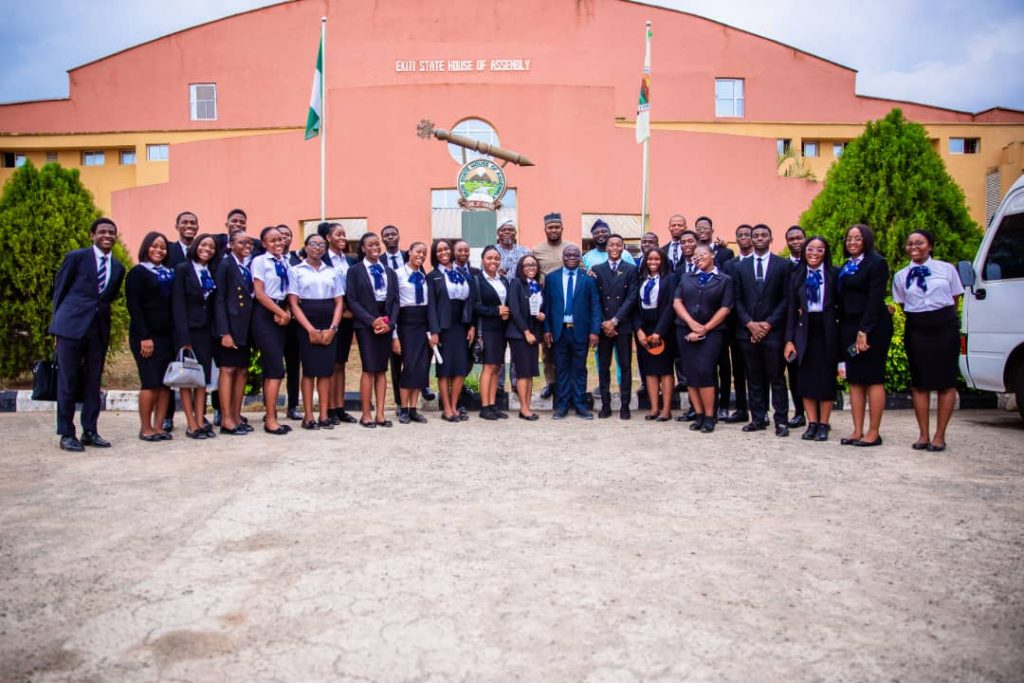
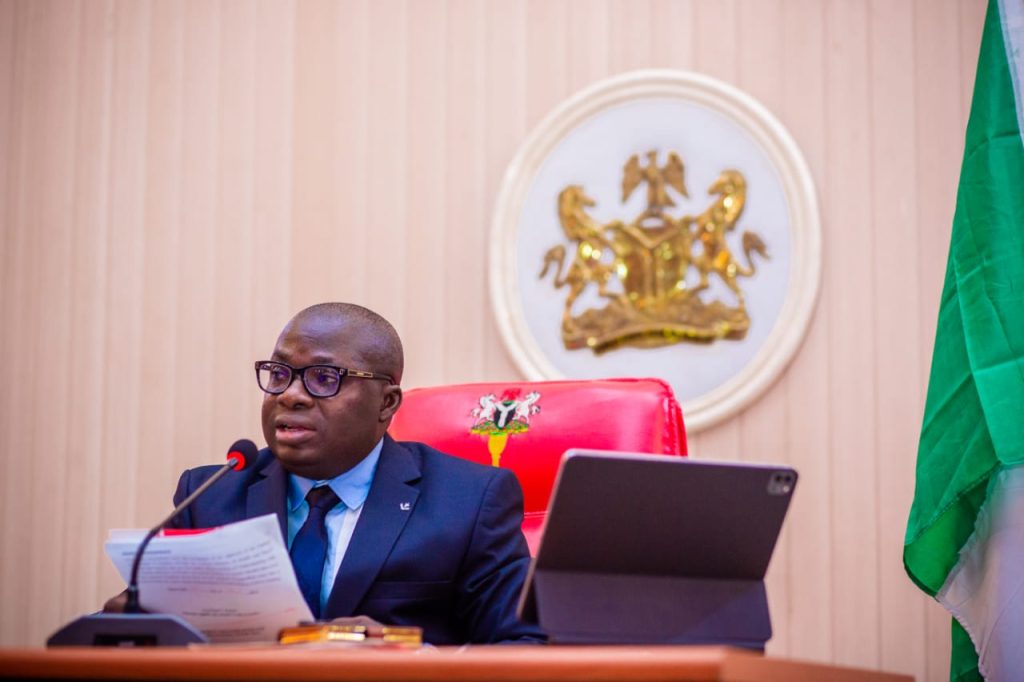
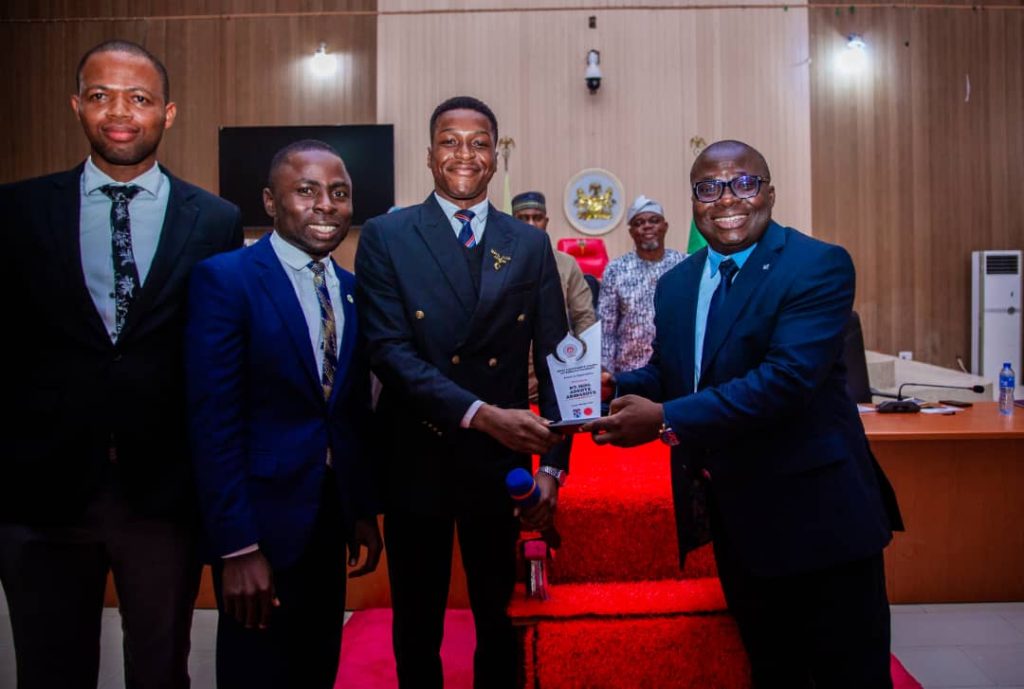
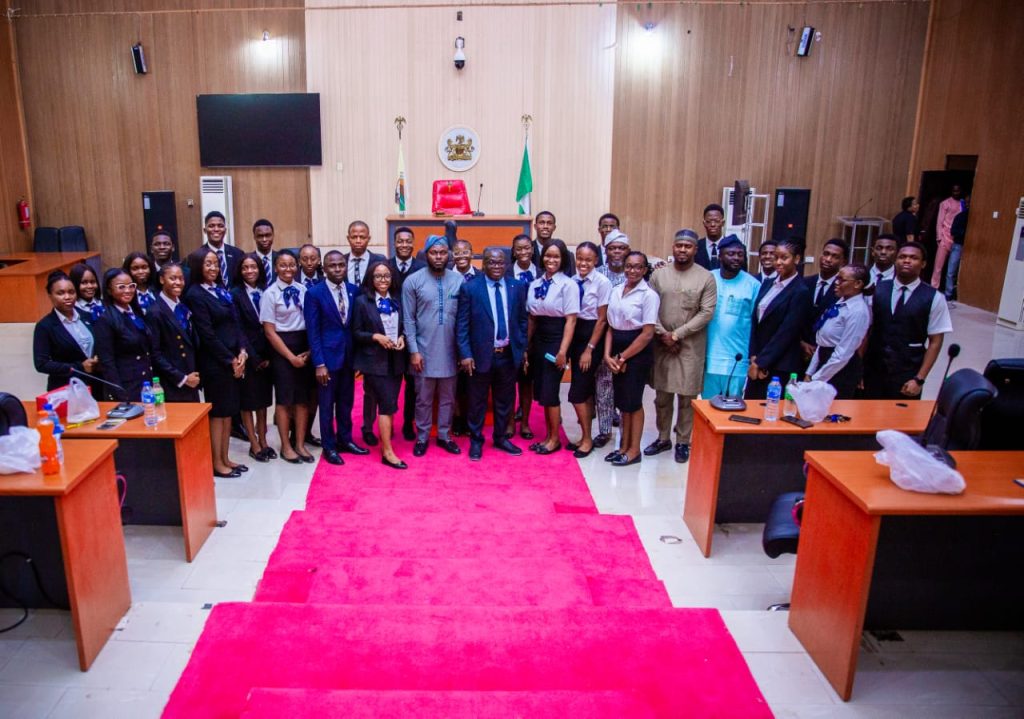
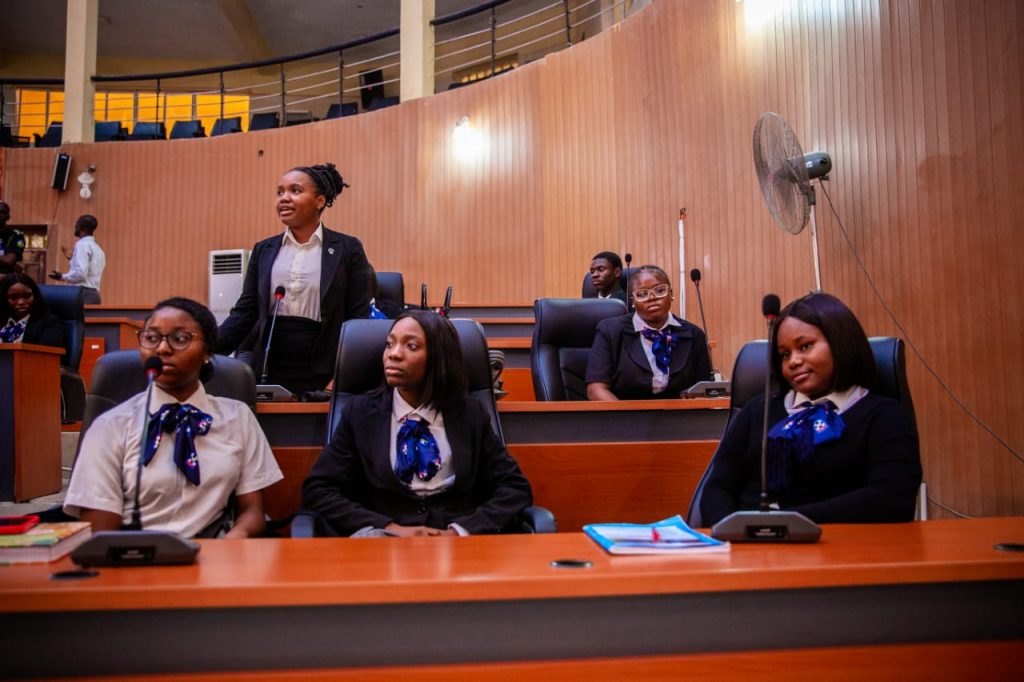
This is the chronological report of Afe Babalola University Law and Community Legal Clinic from 2015-2024
2023-ABUAD-LAW-AND-COMMUNITY-LEGAL-CLINIC-REPORTABUAD-LAW-CLINIC-REPORT-2015-2021
International Collaboration Data Gathering for SDG

Global Network of Human Rights and Environment
In 2022, ABUAD has continued to be a member of the Global Network of Human Rights and Environment, “a global network of thinkers, researchers, policy-makers, opinion-formers, and community activists whose diversity forges new conversations and relationships.”

IUCN Academy of Environmental Law
In 2024, ABUAD has continued to be a member of the IUCN Academy of Environmental Law, a global network of universities that work together “in building environmental law education capacity and promoting the conceptual development of environmental law.”
The network aims to advance environmental law education as a tool for sustainable development.
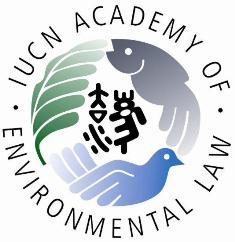
ABUAD continues strong record of international collaboration for SDGs through its membership of the United Nations Academic Impact
Since joining the UNAI in 2018 and up until 2024, ABUAD has continued to advance international cooperation with universities across the world to develop joint programs in key areas relating to the SDGs.

SDSN Network in Nigeria
Since joining the United Nations Sustainable Development Solutions Network in Nigeria in 2016 and up till 2024, ABUAD’s Institute for Oil, Gas, Energy, Environment, and Sustainable Development (OGEES Institute) has continued to play leading roles in mobilizing cross-sectoral dialogue across Nigeria to promote practical SDG solutions. In the same vein, ABUAD as a university body has also been accepted into the Sustainable Development Solutions Network. Below are the links:

Association for the Advancement of Sustainability in Higher Education
ABUAD has been accepted into the Association for the Advancement of Sustainability in Higher Education (AASHE) and its program of Sustainability Tracking, Assessment & Rating System (STARS). The link is as follows:
ABUAD Acceptance into the Association for the Advancement of Sustainability (AASHE)


ABUAD is the only university in Nigeria that is endowed with two (2) United Nations Educational, Scientific, and Cultural Organization (UNESCO) Chairs. They are as follows: The UNESCO Chair on Peace and Citizenship and The UNESCO Chair in Entrepreneurship Education for Sustainable Development.
This is the chronological report of Afe Babalola University Law Clinic from 2015 to 2024.
ABUAD-LAW-CLINIC-REPORT


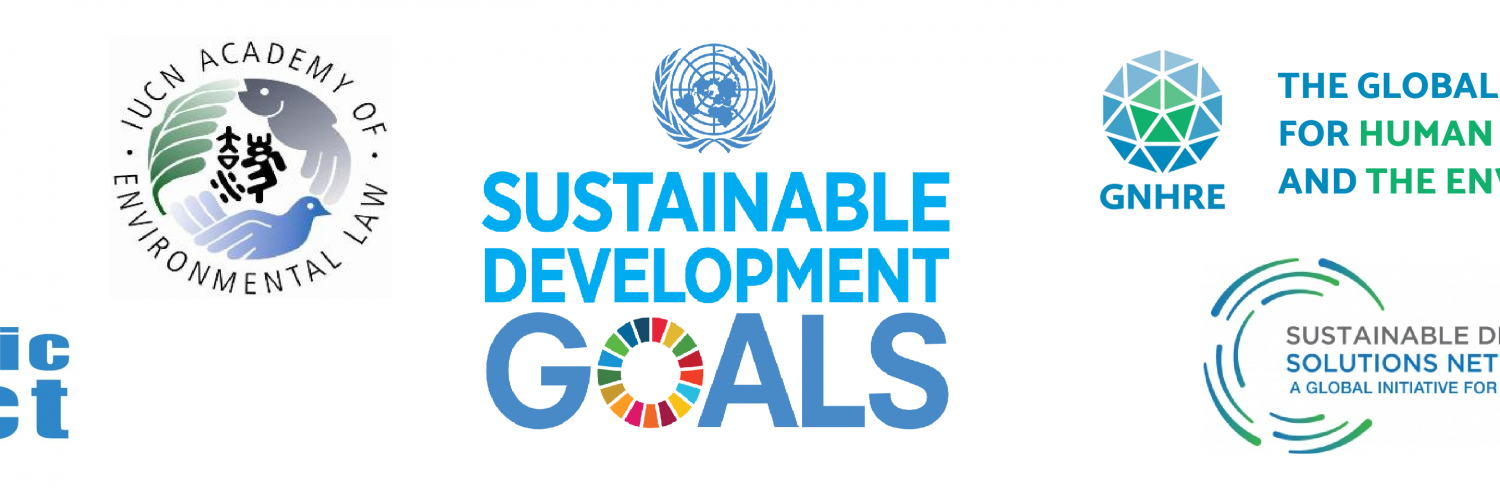
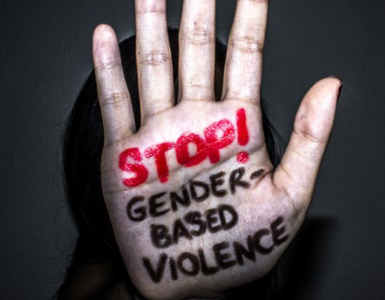
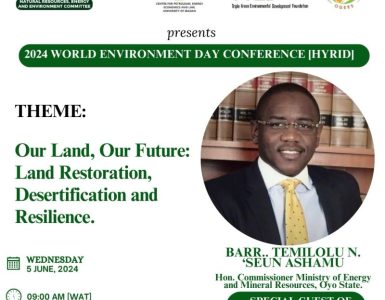
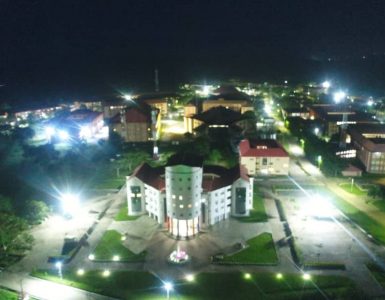
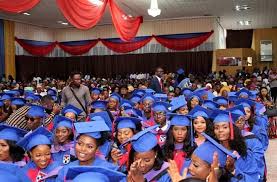











Add comment